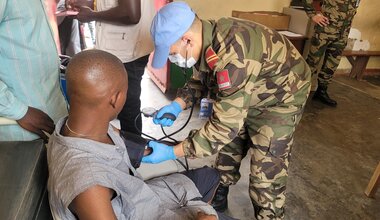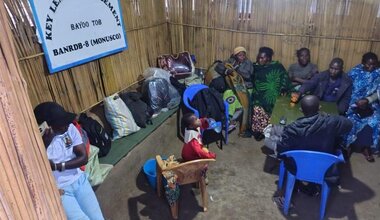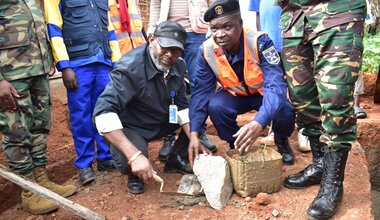Reintegrating former child-soldiers to the beat of capoeira
Ginga, cadera, tres taladji, auxilio, esquiva base, ... forty children practice together the steps of capoeira under the supervision of Dieudonné and Rafael, capoeira instructors and UN Volunteers in charge of the ‘’Capoeira for Peace project. A project whose objective is to introduce demobilized child soldiers to the practice of capoeira.
Every Tuesday and Thursday afternoon, Dieudonné Mosikikongo Nkoy, a.k.a Ninja, and Rafael Cabanillas, a.k.a Cabelo, go to Transfer and Orientation Centre (CTO) to train demobilized children. Deployed in August 2014 with the Capoeira for Peace project, their mission is to coordonate capoeira activities at the CTO. ‘’The idea of the Capoeira for Peace project is to introduce capoeira in reintegration programme for children formerly part of armed groups, says Rafael, and supplement the educational activities and trainingswith a sport activity.’’
The CTO welcomes children aged between 14 and 17, who have recently been demobilized. For an average of three months, the children take part in a resocialisation programme, which includes various activities such as basic training in small trades, sports and recreation, literacy courses, and so on. This is also the time needed to reunite with their families, since at the end of their stay, the children return to their homes.
Entry into roda: An Art Therapy
Capoeira is an Afro-Brazilian martial art that combines music, dance, acrobatics and non-violent struggles.The practice of capoeira by abused children helps them to express their both anger and frustration in a safe way.
Much more than a martial art, capoeira is a philosophy of life based on a set of values, a practice in which there is actually no fighting, no winners nor losers. ‘’Through play and interaction, capoeira offers a place of peace for these children. Capoeira is practiced in ‘roda’ or circle. The ‘roda’ puts everyone on a level playing field, with no distinction between the players. The game also requires that everyone takes part, whether as players, musicians or the audience clapping. It is a space of equality and fraternity where the child can learn the values of respect, sharing and living together, ‘’ says Dieudonné.
Furthermore, thanks to its unifying side, capoeira connects players, builds friendships and develops solidarity between children, encouraging social integration and self-development. ‘’The relationship with the children in the prorgramme is the highlight of my UNV assignment. We can see direct tangible results from the training we provide: At first they keep to themselves, then gradually the children start to laugh and regain confidence in themselves and in others, ‘’ continues Rafael.
The team
Dieudonné Nkoy Mosikongo, from DRC, and Rafael Cabanillas, from Mexico, work together on the Capoiera for Peace project. Both are professional capoerristes and share the same concern for the fellow man, but Ninja and Rafael complement each other as well.
Mechanical engineer by training, Rafael has shifted his focus to social work and reinvented himself as a special education teacher: ‘’It matched my aspirations, ‘’ he says. With his experience with street children in Costa Rica, Rafael brings his expertise in child psychology and project management while Ninja contributes his knowledge of the local language and assists children in their personal development.
For Ninja, getting involved in Capoeira for Peace project, is above all about sharing his expertise and enthusiasm with those children. "Capoeira is my life!" he says. "Capoeira got me off the street. Now it’s my turn to help these children by sharing my passion and knowledge so that it may serve them in life, as it helped me. ‘’ A former street child, Ninja was introduced to capoeira in 2006 during the visit of the Brazilian Association Capoiera Abada. That initiation bore fruit as he became the first capoeira teacher there. In the future, he plans to create his own school where he can train disadvantaged children.
The project
Launched by UNICEF, the Embassy of Brazil and World Amade-Association in August 2014, the pilot project is being implemented in one CTO and one Day Centre set up in Goma to deal with the massive outflow of child soldiers. Over 12 months, it is expected that 1,200 children will benefit from this programme. According to UNICEF, 3,663 children currently associated with armed forces and other groups, particularly in the Kivu and Katanga.
 UN
UN United Nations Peacekeeping
United Nations Peacekeeping






